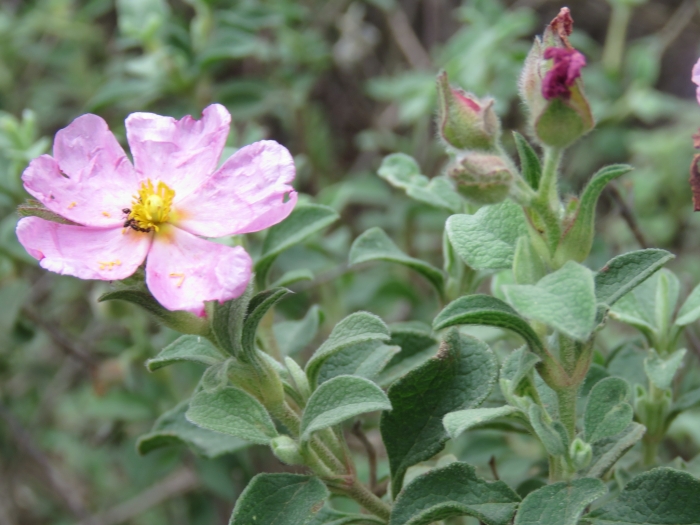Small-Flowered Cistus
(Cistus parviflorus)
Small-Flowered Cistus (Cistus parviflorus)
/
/

© Ronald Flipphi
CC BY-SA 4.0
Image By:
© Ronald Flipphi
Recorded By:
Copyright:
CC BY-SA 4.0
Copyright Notice:
Photo by: © Ronald Flipphi | License Type: CC BY-SA 4.0 | License URL: http://creativecommons.org/licenses/by-sa/4.0/ | Uploader: ronald_flipphi | Publisher: iNaturalist |
























Estimated Native Range
Summary
Cistus parviflorus, commonly known as Small-flowered Cistus, is a perennial shrub native to the Mediterranean region, particularly thriving in maquis and garigue habitats, as well as in coastal areas. It is well-adapted to the dry, rocky soils and sunny conditions of its native environment. This species typically grows to a height of 1-2 feet (0.3-0.6 meters) with a similar spread, and is characterized by its woody base and green, hairy leaves.
Small-flowered Cistus produces an abundance of white to whitish-pink flowers, each with five petals and a yellow center, blooming from late spring to early summer. The flowers are relatively small but numerous, creating a showy display against the dark foliage. It is appreciated for its drought tolerance and low maintenance requirements, making it suitable for xeriscaping and Mediterranean gardens. In cultivation, it is often used for ground cover, rock gardens, and as part of mixed shrub borders. Cistus parviflorus prefers well-drained soils, tolerates poor fertility, and requires full sun exposure to thrive. While generally disease-resistant, it can be susceptible to root rot in poorly drained soils and may struggle in cold, wet climates.CC BY-SA 4.0
Small-flowered Cistus produces an abundance of white to whitish-pink flowers, each with five petals and a yellow center, blooming from late spring to early summer. The flowers are relatively small but numerous, creating a showy display against the dark foliage. It is appreciated for its drought tolerance and low maintenance requirements, making it suitable for xeriscaping and Mediterranean gardens. In cultivation, it is often used for ground cover, rock gardens, and as part of mixed shrub borders. Cistus parviflorus prefers well-drained soils, tolerates poor fertility, and requires full sun exposure to thrive. While generally disease-resistant, it can be susceptible to root rot in poorly drained soils and may struggle in cold, wet climates.CC BY-SA 4.0
Plant Description
- Plant Type: Shrub
- Height: 1-3 feet
- Width: 3-3 feet
- Growth Rate: Moderate
- Flower Color: White
- Flowering Season: Spring, Summer
- Leaf Retention: Evergreen
Growth Requirements
- Sun: Full Sun
- Water: Low
- Drainage: Fast
Common Uses
Border Plant, Drought Tolerant, Groundcover, Low Maintenance, Rock Garden, Showy Flowers
Natural Habitat
Native to Mediterranean maquis, garigue habitats, and coastal areas
Other Names
Common Names: Small-flowered Cistus
Scientific Names: , Cistus parviflorus, Cistus complicatus, Cistus creticus, Cistus cymosus, Cistus lilacinus, Cistus lilacinus, Cistus parviflorus var. brevifolius, Cistus parviflorus var. spathulatus,
GBIF Accepted Name: